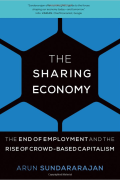My Account
Subscriptions
Summary Categories
Summary Collections
- Career & Life Satisfaction Collection
- Disruptive Innovation Collection
- Exceptional Leadership Collection
- Great Employees Only Collection
- Hidden Gems Collection
- Marketing Collection
- Must-Read Books for 2012 v1
- Must-Read Books for 2012 v2
- Must-Read Books for 2013
- Self-Help Collection
- Small Business Collection
- Strategic Assessment Collection
- Strategic Genius Collection
- Take Charge Collection
- Team Management Collection
- Ultimate Sales Collection
- Web Marketing Collection
Summary List
The Sharing Economy:The End of Employment and the Rise of Crowd-Based Capitalism
Arun Sundararajan
Summarized July 2016
Type: [SUMMARY]
SKU: 7161
ISBN: 0262034573
Price: $12.50
Available Formats:






Purchase Summary
Summary Description
Sharing isn't new. Giving someone a ride, having a guest in your spare room, running errands for someone, or participating in a supper club, are not revolutionary concepts. This summary explains the transition to “crowd-based capitalism,” a new way of organizing economic activity that will soon supplant much of the traditional corporate-centered model. It examines how the economy, our social fabric, government regulation, and what it means to have a job will be affected, as peer-to-peer commercial exchange blurs the lines between the personal and the professional.
Sharing isn't new. Giving someone a ride, having a guest in your spare room, running errands for someone, or participating in a supper club, are not revolutionary concepts. What is new, in the new “sharing economy,” is that you are not helping a friend for free; you are providing these services to a stranger for money.
In The Sharing Economy: The End of Employment and the Rise of Crowd-Based Capitalism, Arun Sundararajan (Sun-DAR-a-ra-jan) explains the transition to “crowd-based capitalism,” a new way of organizing economic activity that will soon supplant much of the traditional corporate-centered model. It examines how the economy, our social fabric, government regulation, and what it means to have a job will be affected, as peer-to-peer commercial exchange blurs the lines between the personal and the professional.
Sundararajan is a professor at NYU and an expert on the sharing economy. Drawing on extensive research and numerous real-world examples including Airbnb, Lyft, Uber, Etsy, TaskRabbit, France's BlaBlaCar, China's Didi Kuaidi, and India's Ola, he explains the basics of crowd-based capitalism.
Sundararajan also considers how this new paradigm will impact economic growth and the future of work. Will we live in a world of empowered entrepreneurs who enjoy professional flexibility and independence? Or will we become disenfranchised digital laborers scurrying between platforms in search of the next wedge of piecework?
The Sharing Economy highlights the important policy choices and suggests possible new directions for self-regulatory organizations, labor law, and funding our social safety net.
 Member Log In
Member Log In